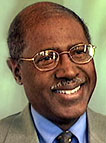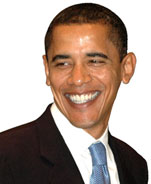By Ron Walters
-Guest Columnist-
Is There a Cost?

Just back from the Rainbow Push convention in Chicago sponsored by Rev. Jesse Jackson, Sr., I was struck by the fact that neither Barack nor Michelle Obama showed up and they live virtually right down the street.
The symbol of Obama’s absence was made even more vivid to me because he was out making nice with Hillary Clinton to knit together a unified campaign in the fall.
I understand that, but I also understand that he could have showed up, when Governor Bill Richardson, who lives in New Mexico not only showed up, but gave a rousing speech crediting the civil rights movement for much of the political success of the Hispanic community and his own.

I know, I know, it is common knowledge now that Barack Obama has to distance himself from Black radicals, from his church, and much of his community in order to make White voters comfortable enough with him to trust him and then give him their votes. And he will probably show at the NAACP Convention. But the troubling trend which finds him absent from other venues that are the substance of Black life looks like he is taking the Black community for granted because of its thirst for his victory.
I was not too put out when Obama did not show up at the State of Black America, because Michelle Obama was offered to Tavis Smiley and Obama was campaigning to win a touch primary in Indiana.
Jackson, however, not only was material in Barack Obama’s rise to the State Senate and the U. S. Senate, he represents to most people the living legacy of Dr. Martin Luther King, Jr.
That is important because the Civil Rights movement is implicated in Obama’s victories, since he won 99 pledged Delegates in nine Southern states during the primary elections. This performance was in states where Blacks constituted one-third or more of the Democratic Party base, states where the Voting Rights Act worked to empower Black voters to make a difference.
Without those 99 delegates, Hillary Clinton would have won the pledged delegate race and the popular vote and most surely would have won the nomination.
The question this raises is whether the sophistication of Black voters in this case will eventually cost them. Blacks have a long history of voting for Whites when the potential returns were based on hope.
If we support a Black candidate for president of the United States, I think that it is fair to ask whether we will have more or less access–at least as much access as we did to Bill Clinton–and whether he will deliver the goods for our community.
My concern here is that theory of Black politics should be to move our community from just hoping their political participation will lead to resources, to exercising tough leverage over politicians to negotiate potential returns to our community in exchange for our vote.
In fact, one of the lessons of Rev. Jackson’s two previous presidential campaigns is that “Hope and Trust politics” is not as effective as the ability to trade votes for future support. The irony is, however, that when a Black person runs for high profile office our leverage often disappears because we are asked to trust that the person will deliver based on their ties to the Black community.
The Black community didn’t have to play the politics of leverage with Rev. Jackson because he had proved his fidelity to their needs through his history and in his presidential campaigns he spoke forcefully to their issues. I know, I know, he didn’t win.
But I am driven to ask what the traditional notion of “winning” is worth under circumstances where the level of trust is not as high, because the message is absent and the candidate is absent. In other words, how much can the Black community count on the delivery of goods and services by a Black president whose presence and message does not privilege his own community?
What concerns me is that we are involved in a great celebration without checking the guideposts that determine whether or not there will be sufficient returns to our community from a Black president in the White House. The irony is that Obama is likely to win, we will have to accept him, but under circumstances where he is essentially a White candidate, so we should “bottom line” our public policy requirements now as every other community is doing.
(Dr. Ron Walters is the Distinguished Leadership Scholar, Director of the African American Leadership Center and Professor of Government and Politics at the University of Maryland College Park. One of his previous books is: Black Presidential Politics in America, (State University of New York Press).
Related link:
Run, Obama, run (FCN/Dr. Ron Walters, 01-06-2007)












